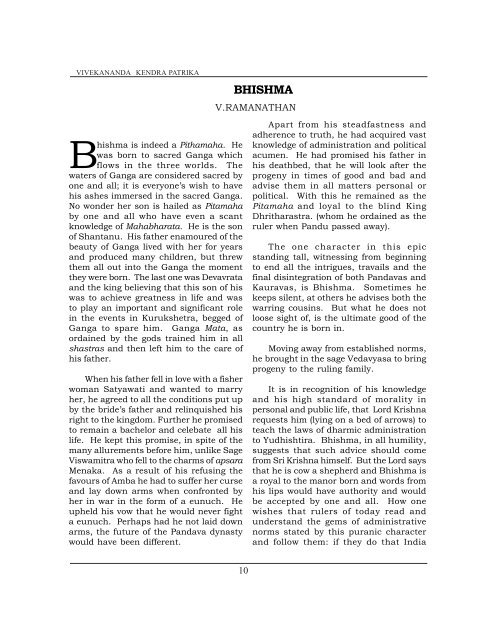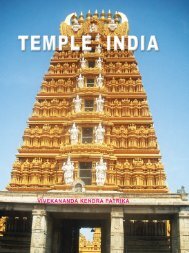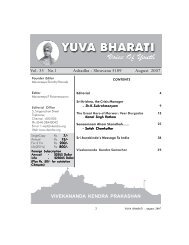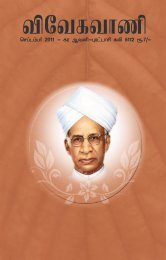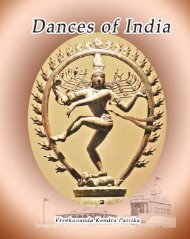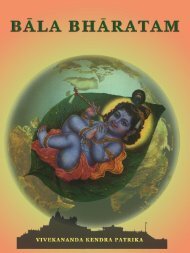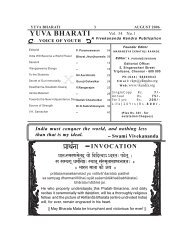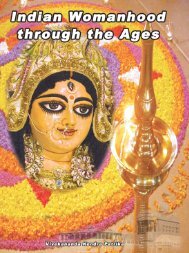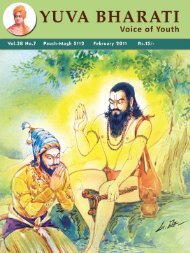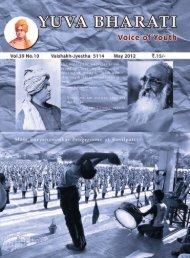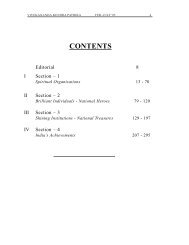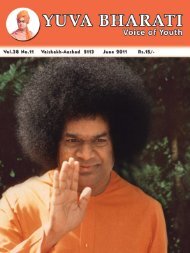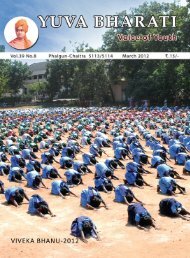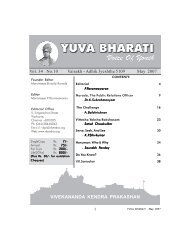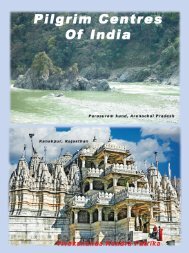Epics in Imprints-1.pdf - Vivekananda Kendra Prakashan
Epics in Imprints-1.pdf - Vivekananda Kendra Prakashan
Epics in Imprints-1.pdf - Vivekananda Kendra Prakashan
Create successful ePaper yourself
Turn your PDF publications into a flip-book with our unique Google optimized e-Paper software.
VIVEKANANDA KENDRA PATRIKA<br />
Bhishma is <strong>in</strong>deed a Pithamaha. He<br />
was born to sacred Ganga which<br />
flows <strong>in</strong> the three worlds. The<br />
waters of Ganga are considered sacred by<br />
one and all; it is everyone’s wish to have<br />
his ashes immersed <strong>in</strong> the sacred Ganga.<br />
No wonder her son is hailed as Pitamaha<br />
by one and all who have even a scant<br />
knowledge of Mahabharata. He is the son<br />
of Shantanu. His father enamoured of the<br />
beauty of Ganga lived with her for years<br />
and produced many children, but threw<br />
them all out <strong>in</strong>to the Ganga the moment<br />
they were born. The last one was Devavrata<br />
and the k<strong>in</strong>g believ<strong>in</strong>g that this son of his<br />
was to achieve greatness <strong>in</strong> life and was<br />
to play an important and significant role<br />
<strong>in</strong> the events <strong>in</strong> Kurukshetra, begged of<br />
Ganga to spare him. Ganga Mata, as<br />
orda<strong>in</strong>ed by the gods tra<strong>in</strong>ed him <strong>in</strong> all<br />
shastras and then left him to the care of<br />
his father.<br />
When his father fell <strong>in</strong> love with a fisher<br />
woman Satyawati and wanted to marry<br />
her, he agreed to all the conditions put up<br />
by the bride’s father and rel<strong>in</strong>quished his<br />
right to the k<strong>in</strong>gdom. Further he promised<br />
to rema<strong>in</strong> a bachelor and celebate all his<br />
life. He kept this promise, <strong>in</strong> spite of the<br />
many allurements before him, unlike Sage<br />
Viswamitra who fell to the charms of apsara<br />
Menaka. As a result of his refus<strong>in</strong>g the<br />
favours of Amba he had to suffer her curse<br />
and lay down arms when confronted by<br />
her <strong>in</strong> war <strong>in</strong> the form of a eunuch. He<br />
upheld his vow that he would never fight<br />
a eunuch. Perhaps had he not laid down<br />
arms, the future of the Pandava dynasty<br />
would have been different.<br />
BHISHMA<br />
V.RAMANATHAN<br />
10<br />
Apart from his steadfastness and<br />
adherence to truth, he had acquired vast<br />
knowledge of adm<strong>in</strong>istration and political<br />
acumen. He had promised his father <strong>in</strong><br />
his deathbed, that he will look after the<br />
progeny <strong>in</strong> times of good and bad and<br />
advise them <strong>in</strong> all matters personal or<br />
political. With this he rema<strong>in</strong>ed as the<br />
Pitamaha and loyal to the bl<strong>in</strong>d K<strong>in</strong>g<br />
Dhritharastra. (whom he orda<strong>in</strong>ed as the<br />
ruler when Pandu passed away).<br />
The one character <strong>in</strong> this epic<br />
stand<strong>in</strong>g tall, witness<strong>in</strong>g from beg<strong>in</strong>n<strong>in</strong>g<br />
to end all the <strong>in</strong>trigues, travails and the<br />
f<strong>in</strong>al dis<strong>in</strong>tegration of both Pandavas and<br />
Kauravas, is Bhishma. Sometimes he<br />
keeps silent, at others he advises both the<br />
warr<strong>in</strong>g cous<strong>in</strong>s. But what he does not<br />
loose sight of, is the ultimate good of the<br />
country he is born <strong>in</strong>.<br />
Mov<strong>in</strong>g away from established norms,<br />
he brought <strong>in</strong> the sage Vedavyasa to br<strong>in</strong>g<br />
progeny to the rul<strong>in</strong>g family.<br />
It is <strong>in</strong> recognition of his knowledge<br />
and his high standard of morality <strong>in</strong><br />
personal and public life, that Lord Krishna<br />
requests him (ly<strong>in</strong>g on a bed of arrows) to<br />
teach the laws of dharmic adm<strong>in</strong>istration<br />
to Yudhishtira. Bhishma, <strong>in</strong> all humility,<br />
suggests that such advice should come<br />
from Sri Krishna himself. But the Lord says<br />
that he is cow a shepherd and Bhishma is<br />
a royal to the manor born and words from<br />
his lips would have authority and would<br />
be accepted by one and all. How one<br />
wishes that rulers of today read and<br />
understand the gems of adm<strong>in</strong>istrative<br />
norms stated by this puranic character<br />
and follow them: if they do that India


